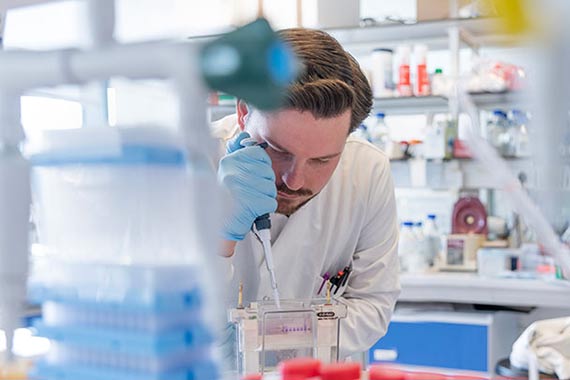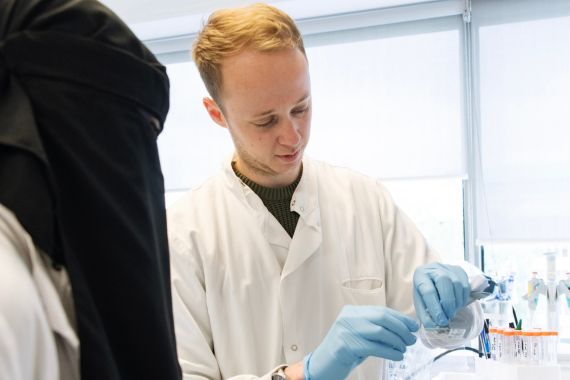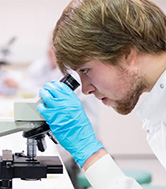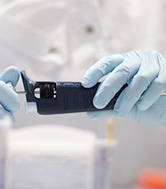Elevate your expertise and drive change in healthcare.
Are you a clinician passionate about making a difference in your field and beyond?
A clinical PhD is your opportunity to deepen your expertise, contribute to groundbreaking discoveries, and drive innovation in your area of healthcare.
You'll develop advanced skills, knowledge, and experience to enhance your academic career prospects and create meaningful improvements in patient outcomes and healthcare systems.
If you’re driven to broaden your horizons and influence change, a PhD in the Faculty of Biology, Medicine and Health at Manchester is a transformative investment in your future.
Why choose a clinical PhD?
Make your mark in biology, medicine and health
When to pursue a clinical PhD?
Timing is key
A PhD can be pursued at various stages of your career after earning your degree.
Specifically when you choose to undertake one is dependant on your career priorities. You'll need to consider if you have enough time to complete your research as well as if you have time to maximise the benefits of the doctorate alongside long-term career aspirations.
In rare cases, such as if you're studying a medical degree, you can intercalate and begin your PhD during your degree.
Here are some other factors to consider before deciding when to undertake your PhD:
Programmes and funding
Plan your application around available programmes and funding.
Many scholarships and grants are time-sensitive, so check the application cycle of opportunities you’re interested in to increase your chances of success.

Clinical lectureship
Starting your PhD too close to the end of your specialist training (within 12 months) may limit your opportunities to secure a clinical lectureship.
Clinical lectureships combine clinical and academic training, but end when your clinical training is completed.
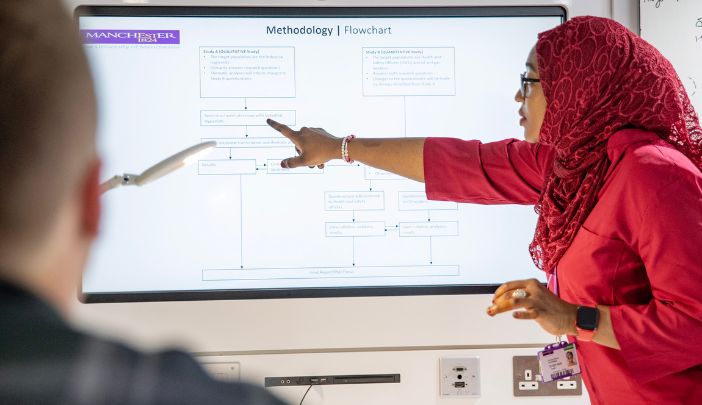
Clinical academic career path
If your goal is to follow a clinical academic career path, the ideal time to start a PhD is during your specialist training, after completing all professional exams (e.g., MRCP, FRCP).
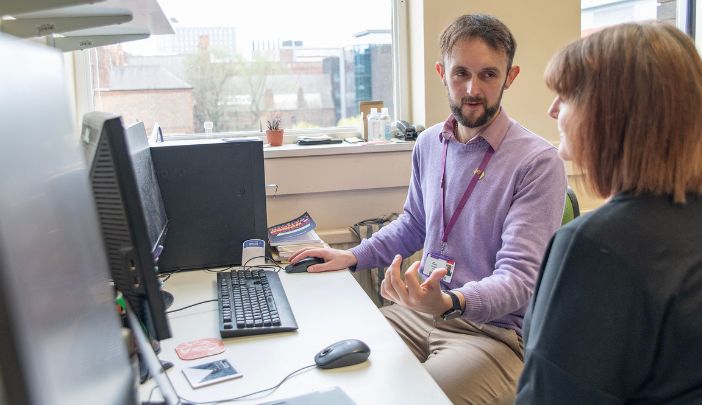
Why Manchester?
Range of research specialties
We host a wide range of clinical, preclinical, and basic science research, linked to all clinical specialties.
This makes it easy to find a research area or specific project aligned with your interests.

Integrated structure
Our integrated structure brings together discovery biology, clinical application, and patient care.
This offers a unique opportunity to conduct impactful research.
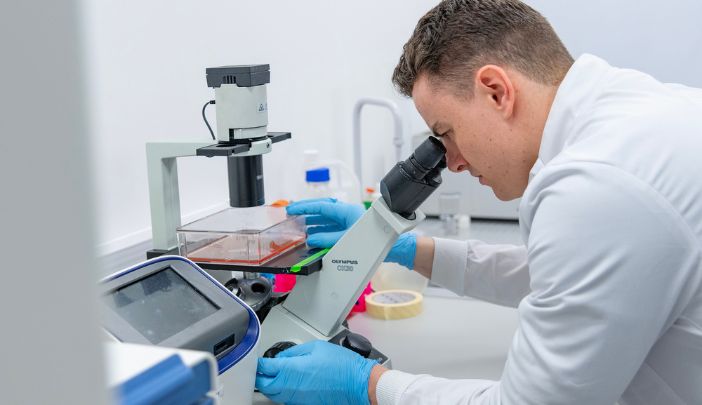
Partnerships
Our partnerships with research councils, charities and industry provide a strong foundation for your clinical academic career.
Current partnerships include the Biomedical Research Centre, charities the British Heart Foundation, Cancer Research UK, Diabetes UK, and Wellcome Trust, and industry leaders Unilever, AstraZeneca, GlaxoSmithKline, and Boots

Discover Manchester
Join the 34th best university in the world, 10th best in Europe and 6th best in the UK (QS World University Rankings, 2025), and undertake research that will open doors in your career.

PHD vs MD
Compare research degrees suitable for clinicians
In the UK, there are two principal research degrees suitable for clinicians, the Doctor of Philosophy (PhD) and the Doctor of Medicine (MD). Both offer rigorous academic training but differ in structure, scope, and purpose.
The PhD is the most internationally recognised research degree and is open to individuals from a wide range of academic and professional backgrounds, including medicine.
A PhD typically takes three to four years of full-time study (or longer part-time) and is centred on the completion of an original, substantial body of research that contributes new knowledge to a chosen field.
Clinicians undertaking a PhD often investigate complex problems related to clinical care, public health, medical education, or translational science. The focus may be laboratory-based, epidemiological, qualitative, or mixed-methods, depending on the research question.
A PhD involves:
- Designing and conducting an original research project.
- Critical review of existing literature.
- Development and application of appropriate research methodologies.
- Submission of a thesis (usually 80,000 to 100,000 words).
- Oral examination (viva voce) to defend the thesis.
PhDs can be funded through fellowships (e.g. NIHR, Wellcome Trust, MRC), university scholarships, or institutional support. Increasingly, Clinical Academic Training pathways support integrated clinical and academic careers, allowing protected time for research alongside clinical responsibilities.
The MD is a research degree specifically for qualified medical doctors.
It is typically shorter than a PhD—usually two years full-time or part-time equivalent—and is focused on original research rooted in clinical practice.
It is well suited to clinicians who wish to develop research expertise within their speciality and often builds on clinical work they are already engaged in.
The MD involves:
- Conducting a defined clinical research project.
- Demonstrating a critical understanding of research methods and ethics.
- Writing a thesis (typically 50,000 to 70,000 words).
- Undergoing a viva examination.
This type of research degree is particularly suitable for early-career clinicians looking to establish a research track record without the longer commitment of a PhD.
The choice between a PhD and an MD depends on your career aspirations, research interests, and available time.
A PhD may be more appropriate for those considering a long-term academic career with future research leadership roles.
An MD can be a more practical option for clinicians wanting to gain research experience and recognition while maintaining a predominantly clinical focus.
Both degrees enhance critical thinking, methodological rigour, and contribute to improved patient care. They also open doors to academic collaborations, funding opportunities, and career advancement in both clinical and academic domains.
Clinical PhD studentships
Explore external sources of funding.
Discuss external funding sources with your supervisor and identify other funding opportunities from research councils, industry, charities, or government-sponsored programmes.
Explore some of these externally funded clinical schemes below:
-

NIHR Doctoral Award
Pursue a fully funded PhD that combines academic excellence with patient-focused research through the National Institute for Health and Care Research. Develop the skills to become a future leader in health and care research, tackling key challenges across disciplines.
Visit NIHR to find out more
-

MRC Clinical Research Training Fellowship
Shape the future of medical and healthcare sciences with our fully funded Medical Reseach Council (MRC) Doctoral Training Partnership (DTP). Engage in research to address key priortities across biomedical, clinical and health service areas and fulfil healthcare needs in the UK and across the world.
More about MRC DTP studentships
-

British Heart Foundation PhD 4-Year PhD Programme
Contribute to pioneering research in heart disease and cardiology with our fully funded British Heart Foundation (BHF) PhD programme. Receive tailored doctoral training through a one-year MRes in cardiovascular sciences before choosing a research project in areas like cell signalling, human genetics, informatics, and bioengineering.
More about the 4-year PhD programme
-

4Ward North PhD Programme for Health Professionals
Advance your clinical academic career with the fully funded 4WardNorth Clinical PhD Academy. This prestigious programme supports outstanding nurses, midwives, pharmacists, allied healthcare professionals and healthcare scientists to develop as future leaders in clinical research.
More about the 4Ward North PhD programme for health professionals
-

Cancer Research UK Leeds-Manchester Clinical Research Training Fellowships
Develop a career in world-leading cancer research through our fully funded clinical and non-clinical Cancer Research UK (CRUK) Manchester Centre PhD Training Scheme. Join a vibrant research environment, benefit from world-class cancer research facilities, and much more.
More about the Cancer Research UK Manchester Centre PhD Training Scheme
Clinical projects
Discover our clinical postgraduate research opportunities.
Advertised projects
Throughout the year postgraduate research supervisors advertise projects across a wide range of research areas.
This includes funded and self-funded clinical projects which you can apply for directly once you’ve contacted the supervisor to check you’re a suitable candidate.
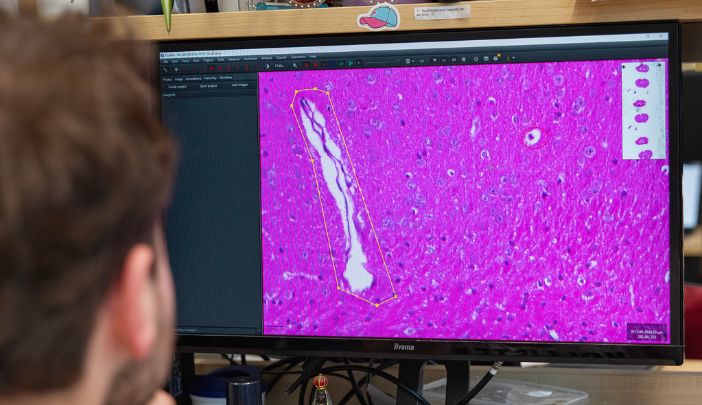
Discover research in your speciality
As one of the largest medical faculties in the country, we have a comprehensive range of medical research expertise and the ability to offer research projects in most clinical specialities.
We can help you explore potential research opportunities in your field and match you with funding available through charities, research councils and other external sources.

Funding and application routes
Learn about the different types of funding available
All major research charities and national funding bodies offer research training fellowships. These typically fund your salary (excluding the on-call supplement) and research costs, and will usually last between three and four years.
To apply, you must complete an application form in collaboration with your supervisor. This will include your research proposal, full costings, and a career plans statement. Some funding bodies may also require an interview. After submission, it may take 6–8 months to receive a decision.
This option requires considerable planning, so you should begin preparing your application at least 12 months before your intended PhD start date. Most funders will only support research that leads to the award of a PhD.
- Main advantage: You can choose your supervisor and contribute to project design in an area of particular interest.
- Main disadvantage: The high level of planning and preparation required.
Institutional awards, such as those from the Manchester NIHR Biomedical Research Centre or the Manchester BHF Centre of Research Excellence, offer locally advertised research training fellowships. These will generally be advertised as pre-defined projects which lead to a PhD.
These opportunities cover your salary (excluding on-call supplement) and research costs. They typically take around three years. You can apply for these opportunities directly through each institution, an interview is usually required.
- Main advantage: Requires less planning, with a shorter lead time of four to six months before starting your research.
- Main disadvantage: Fewer opportunities to design your project or choose a supervisor.
Many pre-defined, advertised research projects require input from a clinician and will have funding available to cover both salary and research costs. The duration of these projects varies, but it will take between two and four years, and funding may support either a PhD or an MD candidate.
Like the local fellowships, this option requires less planning and typically involves a four to six month timeline to begin your research.
- Main advantage: Quicker route to starting research with funding already in place.
- Main disadvantage: Limited flexibility in research topic and supervisor choice.
Self-funding your clinical PhD will be require you to personally secure resources to cover your tuition fees, salary and research costs.
Explore external funding opportunities to fund your research.
- Tuition fees: Not all funding options cover tuition fees, so it's crucial to confirm this before you commit. You can find out more about our tuition fees on our ‘fees and funding’ page.
- On-call supplement: Funded salaries typically do not include the on-call supplement, which will result in a drop in income. You’ll need to ensure you factor this into your financial planning.
What to consider when applying
Everything you need to think about when you apply.
Person
You must clearly explain why you are the best candidate for this research project and how it will develop your career. Consider why this is the right time for you to embark on this research journey before applying.
Project
Clinical academic PhD projects vary greatly, but they should all contribute to a better understanding of health and disease and aim to improve patient care.
Your project should have clear objectives, well-defined research questions, and a solid methodology. Realistic timelines are crucial to ensure the research can be completed within the allotted time. Additionally, your project should offer opportunities for personal growth, develop your expertise in a sub-speciality, and provide essential training.
A successful proposal demonstrates statistical rigour and an understanding of ethical considerations.
Place
Your host institution and supervisory team play a critical role in the success of your PhD. Your supervisors should provide the support you need to become an expert in your field. The team should consist of experts in different areas relevant to your research, ensuring that each supervisor contributes where you have a knowledge gap.
Register your interest
Interested in clinical PhDs?
Be the first to hear about clinical research opportunities as they become available and to receive our monthly postgraduate research newsletter for prospective applicants.

Contact us
Got any questions?
Get in touch with our dedicated clinical postgraduate research team by emailing FBMH.clinicalPhD@manchester.ac.uk


